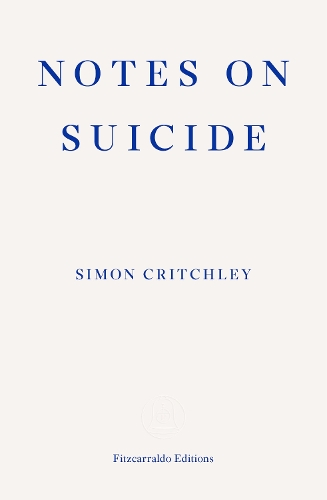
Notes on Suicide
(Paperback, New edition)
Publishing Details
Notes on Suicide
By (Author) Simon Critchley
Fitzcarraldo Editions
Fitzcarraldo Editions
21st October 2015
23rd September 2015
New edition
United Kingdom
Classifications
Tertiary Education
Non Fiction
179.7
Physical Properties
Paperback
112
Width 125mm, Height 197mm
Description
Suicide is everywhere. It haunts history and current events. It haunts our own networks of friends and family. The spectre of suicide looms large, but the topic is taboo because any meaningful discussion must at the very least consider that the answer to the question is life worth living might not be an emphatic yes; it might even be a stern no. Through a sweeping historical overview of suicide, a moving literary survey of famous suicide notes, and a psychological analysis of himself, Simon Critchley offers us an insight into what it means to possess the all too human gift and curse of being of being able to choose life or death.
Five years after its initial publication, this revised edition of Notes on Suicide includes a new preface by the author addressing shifts in the discourse surrounding suicide, particularly in relation to social media.
Reviews
An elegant, erudite, and provocative book that asks us to reflect on suicide without moral judgment and panicked response. For Critchley, many reasons have been given for suicide, but what remains less remarked is how suicide distinguishes human creatures who grapple with melancholy in the face of losses that are too huge or enigmatic to fathom. Though there may be many reasons given within philosophy or popular culture, there are also some simple, insistent truths that do forestall such an action. In his view, suicide saddens the past and abolishes the future, establishing a problematic framework for grasping the whole of a life. This text gestures toward what makes us forgetful about suicide: wondrous and recurring moments when we find ourselves enduring in the here and now.
Judith Butler, author of Gender Trouble
No one ever lacks a good reason for suicide, wrote Cesare Pavese. With passionate lucidity and philosophical intelligence, Simon Critchley explores what these reasons might be, bracketing simple moral judgement and trying to fight his way past the social, psychical and existential blockages that inhibit us whenever we try to think about this ever-baffling issue.
Lars Iyer, author of Wittgenstein Jr
For most arguments about suicide, there's a counter argument, and Critchley makes us think anew about old questions. Is suicide selfish I believed not until a member of my family killed themselves and the pain it caused persuaded me that it's both selfish and stupid. But Critchley reminds us that our responses to suicide are distorted by anger, prejudice and inarticulacy. We must, he argues, stop looking for life's great meaning and instead savour little daily miracles, matches struck in the darkness. And we must talk about suicide without shame or sanctimony. This book is a good place to start.
Max Liu, Independent
Author Bio
Simon Critchley is Hans Jonas Professor of Philosophy at the New School for Social Research in New York. His previous books include Memory Theatre, published by Fitzcarraldo Editions in 2014, On Humour, The Book of Dead Philosophers, How to Stop Living and Start Worrying, Impossible Objects, The Mattering of Matter (with Tom McCarthy), The Faith of the Faithless, Stay, Illusion!: The Hamlet Doctrine (with Jamieson Webster), and Bowie. He is series moderator of 'The Stone', a philosophy column in The New York Times, to which he is a frequent contributor.
